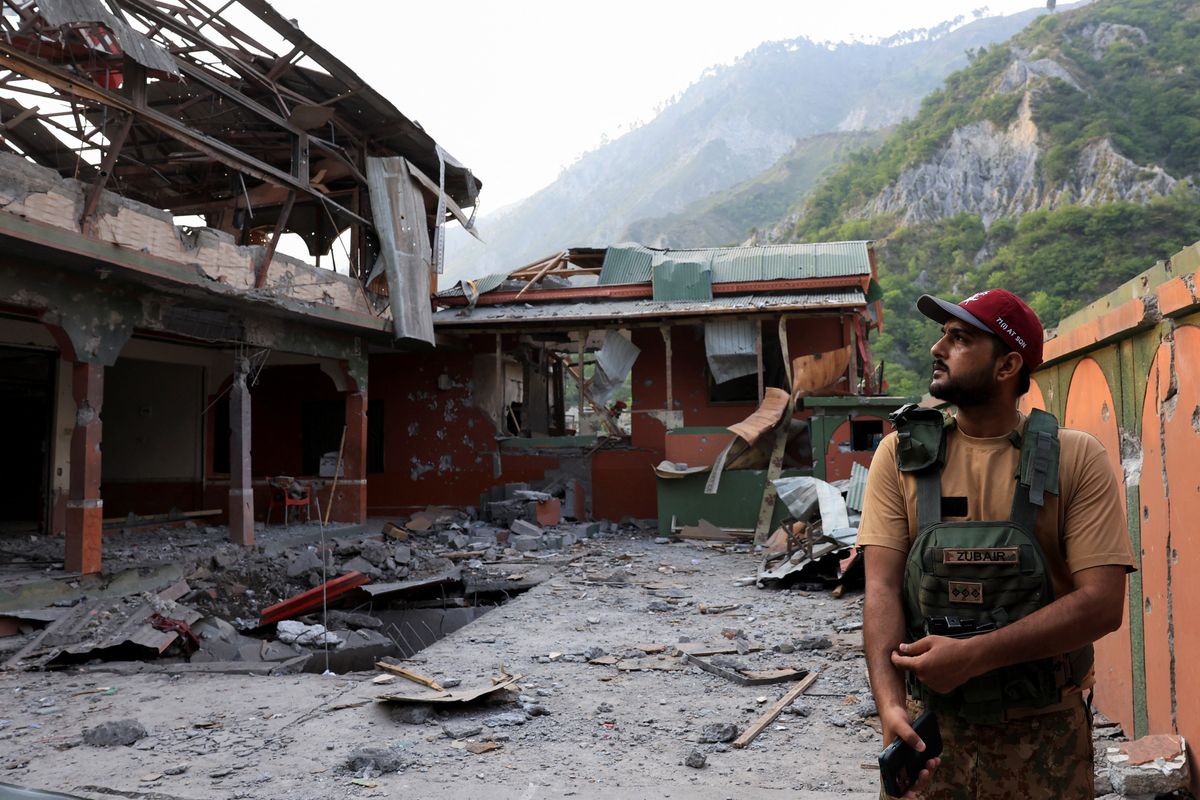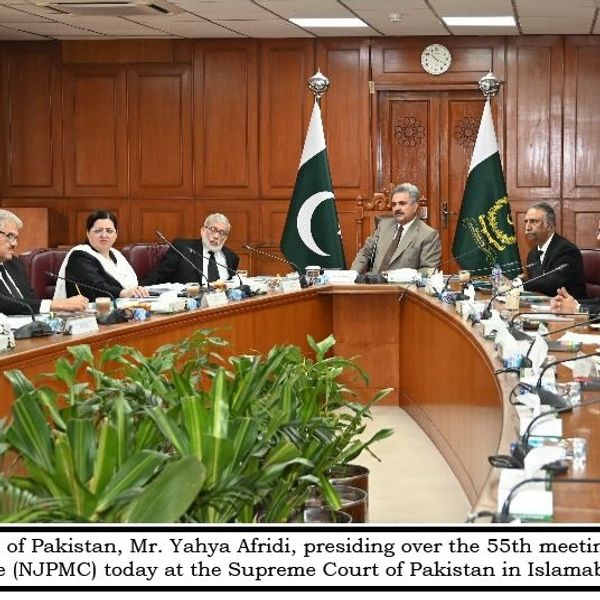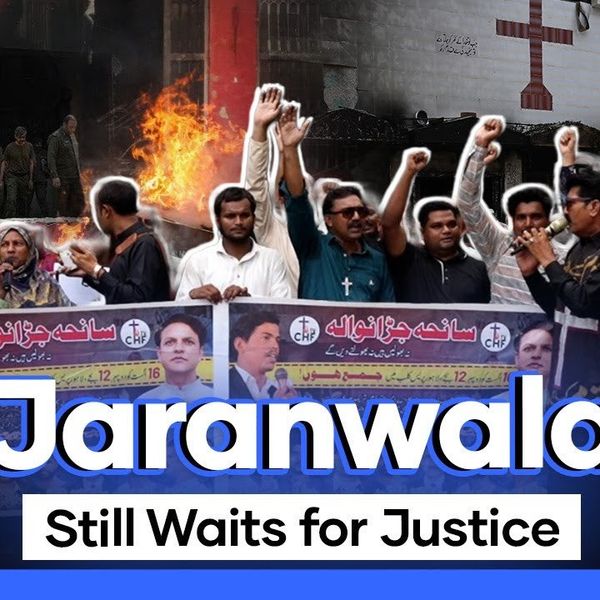What international laws did India violate in its aggression against Pakistan
Strikes on mosques and civilians may amount to war crimes under Geneva Conventions, experts argue

Zain Ul Abideen
Senior Producer
Zain Ul Abideen is an experienced digital journalist with over 12 years in the media industry, having held key editorial positions at top news organizations in Pakistan.

A Pakistan Army soldier stands at the premises of the Bilal Mosque, after it was hit by an Indian strike in Muzaffarabad, the capital of Pakistan-administered Kashmir, May 7, 2025.
Reuters
As the conflict between nuclear-armed neighbors India and Pakistan intensifies, legal experts are raising alarm over what they describe as a series of serious violations of international law committed by India in its recent military actions across the border. From breaches of the United Nations Charter to potential war crimes under the Geneva Conventions, the situation has triggered fresh calls for global intervention and accountability.
India launched strikes on multiple locations inside Pakistan this week following a deadly April 22 attack on tourists in Indian-administered Kashmir. New Delhi blames the attack on Pakistan-based militants—an accusation Islamabad denies.
In response to the Indian offensive, Pakistan claims to have shot down five Indian aircraft and 25 drones, vowing swift retaliation. Civilian casualties on both sides are mounting, with Islamabad reporting 31 dead and New Delhi confirming at least 16 fatalities.
Two of Pakistan’s most prominent international legal experts—Ahmer Bilal Soofi and Hafiz Ahsaan Ahmad Khokhar—say India’s conduct may amount to aggression under international law and could lead to proceedings at the United Nations and other global forums.
Violating the UN Charter: Article 2(4) and acts of aggression
Ahmer Bilal Soofi, an international law expert and former federal law minister who holds an LLM from Cambridge, says India’s use of drones, missile strikes, and the threat to forcibly take Pakistan-administered Kashmir violate Article 2(4) of the United Nations Charter. This article strictly prohibits the use or threat of force against the territorial integrity or political independence of another state.
“What India has done—sending drones and conducting strikes—is an act of aggression and a violation of Article 2(4),” Soofi said. “Even public threats, such as Indian foreign minister Jaishankar saying they will take Azad Kashmir by force, are violations under the U.N. Charter.”
The U.N. General Assembly’s 1974 Definition of Aggression further clarifies that any armed force used by one state against the sovereignty of another—outside of self-defense or Security Council authorization—is aggression. Under this definition, India’s military actions may qualify it as an “aggressor state”.

The right to self-defense and countermeasures
Soofi emphasized that Article 51 of the U.N. Charter allows Pakistan the right to individual or collective self-defense if an armed attack occurs. He adds that under the doctrine of state responsibility, Pakistan is also entitled to countermeasures in response to India’s internationally unlawful acts.
“Whenever one state commits an internationally wrongful act against another, international responsibility arises,” he explained. “That’s the basis on which Pakistan can lawfully respond.”
Civilian casualties and religious sites: Geneva Conventions violated
Both legal experts point to India’s reported targeting of civilian areas and mosques as violations of the Geneva Conventions of 1949, which protect civilians and religious structures during armed conflict.
“Civilian casualties and attacks on places of worship are clear breaches of international humanitarian law,” Soofi said.
Khokhar agrees, warning that these acts may constitute war crimes and crimes against humanity under customary international law and the Rome Statute of the International Criminal Court.

Pahalgam attack and false flag concerns
Hafiz Ahsaan Ahmad Khokhar, a Supreme Court advocate and constitutional and international law expert, highlights the April 22 attack in Pahalgam, which India blamed on Pakistani elements. Khokhar argues that the incident “bears all the hallmarks of a false flag operation,” noting that India’s refusal to accept Pakistan’s offer for a neutral international investigation casts doubt on its narrative.
The subsequent use of military force, he says, violates both Article 2(3)—which obligates states to resolve disputes peacefully—and Article 2(4) of the U.N. Charter.
Water weaponization: Violations of the Indus Waters Treaty
India’s attempt to unilaterally suspend the Indus Waters Treaty of 1960 has opened another legal front. The treaty, brokered by the World Bank, guarantees Pakistan access to specific rivers and is safeguarded under Article XII of the treaty.
Khokhar says India’s actions breach the Vienna Convention on the Law of Treaties (1969)—specifically Article 26, which upholds “pacta sunt servanda” (agreements must be kept), and Article 60, which prohibits unlawful suspension of treaties.

He also references the U.N. Convention on the Law of Non-Navigational Uses of International Watercourses (1997), which obliges co-riparian states to avoid causing significant harm.
“This is water terrorism,” Khokhar said. “India is weaponizing water, violating not only bilateral agreements but also multilateral legal norms.”
Legal remedies: What Pakistan can do
According to Khokhar, Pakistan can—and should—pursue multiple legal avenues, including:
- Requesting an Advisory Opinion from the International Court of Justice (ICJ) under Article 96 of the U.N. Charter
- Bringing the issue before the U.N. Security Council under Chapters VI and VII
- Seeking a U.N. General Assembly resolution to uphold international humanitarian law
- Urging the World Bank to convene a neutral expert or Court of Arbitration under Article IX of the Indus Waters Treaty
He also cited the ICJ’s 1997 Gabčíkovo–Nagymaros Project judgment, which prohibits unilateral suspension of treaty obligations without mutual consent.
The bigger picture: A challenge to global order
Both experts agree that India’s actions constitute a systemic challenge to the international legal order and peace in South Asia. They are urging the global community, particularly the United Nations, the World Bank, and influential states like the United States, to intervene meaningfully.
“India’s pattern of false flag operations, military aggression, and treaty violations cannot be ignored,” said Khokhar. “This is no longer a bilateral issue; it is a threat to international peace and legal norms.










Comments
See what people are discussing